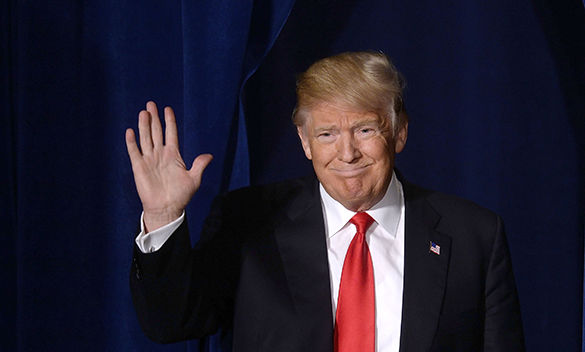Graduation speakers talk Trump in 2016

May 22, 2016
The classic formula for a college commencement speech is pretty simple: biographical anecdotes, advice for the graduates, a broad-strokes description of the current moment, maybe an exhortation to change the world.
Politics might come up, but rarely does a speaker flay a particular leader as a threat to democracy itself.
Yet this spring, in the thick of the 2016 presidential race and the commencement season, people from President Obama to the creator of the musical Hamilton, have portrayed Republican Donald J. Trump in just such apocalyptic terms.
Advertisement
They don’t always call out the real estate developer by name, but when they discuss politicians with a blustery style, an “us-versus-them” message, and casual approach to facts, the references seem clear enough. Signature Trump proposals — such as building a wall with Mexico, renegotiating global free-trade agreements, and scaling back U.S. military involvement abroad — often come up for criticism.
Speaking May 15 at Rutgers University, Obama did not name Trump but attacked his signature proposals — to bar Muslims from entering the United States and to build a border wall — as un-American and counterproductive.
“Ignorance is not a virtue,” Obama said. “It’s not cool to not know what you’re talking about. That’s not ‘keeping it real’ or ‘telling it like it is.’ That’s not challenging political correctness.”
Trump later shot back on Twitter that Obama’s ignorance has made him a failed president.
If his boss was more circumspect, Secretary of State John Kerry named names May 6 at Northeastern University in Boston.
“You are the most diverse class in Northeastern’s history — in other words, you are Donald Trump’s worst nightmare,” Kerry said, noting that students from 85 nations were receiving degrees.
“We will never come out on top if we accept advice from sound bite salesmen and carnival barkers who pretend the most powerful country on Earth can remain great by looking inward and hiding behind walls at a time that technology has made that impossible to do and unwise to even attempt,” Kerry said.
Advertisement*
A ceremonial occasion like commencement is not the usual forum for partisan invective, said David Greenberg, professor of history and media studies at Rutgers University.
“Trump is seen by some as a different species,” Greenberg said. “He is exceptionally vulgar and nasty in his style, but he also comes from outside the system. The speeches are framed as someone concerned with the health of the American political system warning that Trump threatens that.”
Last Wednesday, for instance, Columbia University President Lee C. Bollinger decried the “continuing appeal of intolerance and the persistent attraction of authoritarian rule” in established democracies, “perhaps including our own.”
He blamed political polarization, intolerance, and a decline in civility — fueled by self-reinforcing social media — for the rise of strongmen who sounded an awful lot like Trump.
“It’s an interesting test: Would anyone say these things if they were talking about Reagan, [George W.] Bush or Nixon, who all were seen as authoritarian or called ‘fascist’ at some point in their careers?” Greenberg said.
During the Bush administration, he said, liberal critics used “apocalyptic” rhetoric in denouncing enhanced interrogation techniques and detention without trial for suspected terrorists — and some conservatives have used charged language to describe Obama as a dictator.
Republican leaders such as Mitt Romney, who spoke at Trine University in Angola, Ind., and a host of conservative thought leaders have criticized Trump as a threat to American values.
“Every generation has had to confront its own demagogues, and every generation has stood up and kept them from the White House — at least so far,” former New York Mayor Michael Bloomberg, an independent, said April 30 at the University of Michigan.
While that may have been a reference to Trump, Bloomberg also put a centrist spin on things, alluding to Vermont Sen. Bernie Sanders, the Vermont socialist seeking the Democratic nomination.
“Candidates in both parties are blaming our problems on easy targets who breed resentment,” Bloomberg said. “For Republicans, it’s Mexicans here illegally and Muslims. And for Democrats, it’s the wealthy and Wall Street.”
Lin-Manuel Miranda, Pulitzer-Prize winning creator of Hamilton told University of Pennsylvania graduates May 16 that their personal stories are critical.
“Don’t believe me?” Miranda said. “In a year when politicians traffic in anti-immigrant rhetoric, there is also a Broadway musical reminding us that a broke, orphan immigrant from the West Indies built our financial system, a story that reminds us that since the beginning of the great unfinished symphony that is our American experiment, time and time again immigrants get the job done.”
Every rhetorician knows you need to leave your audience with a sense of hope, as Bollinger did by reminding Columbia graduates and guests that the United States has survived much worse.
“As bad as you might think things are right now, every generation has gone through versions of this . . . and struggled to come through to the other side,” Bollinger said, mentioning the crackdown on dissent during World War I and the red-baiting McCarthy period of the Cold War.
(c)2016 The Philadelphia Inquirer
Visit The Philadelphia Inquirer at www.philly.com
Distributed by Tribune Content Agency, LLC.
Advertisement









